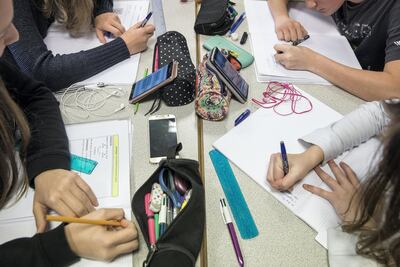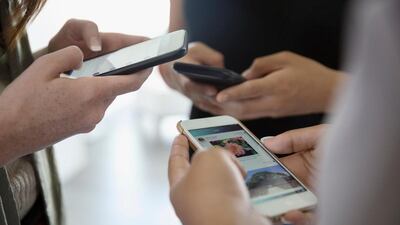A couple of years ago, I placed my smartphone on top of my car while chatting to someone in the street and promptly forgot about it. Minutes later, its absence from my pocket and my inability to find it caused a wave of panic of engulf me. The device had come to represent so much in my life – it oriented and informed me, entertained and connected me. When I eventually found it – still on the car roof – the feeling of relief was huge. But the incident made me think seriously about my phone's role in my life, and how much time I spend looking at its screen.
Scare stories
I'm evidently not the only person who worries about this. Countless books, podcasts and YouTube videos urge us to take a 'digital detox' and recommend various ways to do that. Scare stories in the media warn of the dangers that excessive screen-gazing pose to our physical and mental health, and the effect it can have on our children, in particular. In France, the use of phones in schools has been banned for children under the age of 15, while other governments have called on parents to take a more active role in policing children's usage.
Parallels have been drawn between screen addiction and the effects of alcohol, cocaine, and even heroin, and there is also a suggestion that it can lead to depression and anxiety. Some figures in the media, as well as in academia and our social circles, have stigmatised screen time. But are screens really that dangerous? They may appear to have the potential to cause problems, but is this the case for everyone? And do we need to worry as much as we do?
In context
A new study by the Oxford Internet Institute, a department within Oxford University, attempts to put such concerns in context by analysing the behaviour of some 300,000 smartphone users over three existing datasets. "At most, only 0.4 per cent of adolescent wellbeing is related to screen use," the study says.
It also states that the inclusion of potatoes in your diet shows a similar correlation with wellbeing. In other words, the assertion that screens are inherently bad is misguided. "There shouldn't be a space for such grand claims," says Amy Orben, one of the authors of the study. "Sadly, the people who make the grandest claims tend to get the most air time. This is an attempt to put scientific evidence centre stage."
No one, of course, claims that there is no such thing as excessive phone use. There's plenty of anecdotal evidence and statistical data to back it up. Various surveys tell us that we look at our phones between 50 and 150 times a day, that 70 per cent of us check them within an hour of waking up, and that half of us are unable to cope without them while we're on holiday. Two scales of overuse, the Problematic Use of Mobile Phones (PUMP) and Mobile Phone Problem Use Scale (MPPUS) have been deployed in an attempt to measure levels of supposed addiction, but interpreting what those measurements might mean for society – and the younger generation – is difficult to pin down.
"A lot of the concerns raised around children and technology are not new at all," says Anya Kamenetz, American author of The Art Of Screen Time: How Can Your Family Balance Digital Media and Real Life. "It's a classic moral panic. In the past it was comic books, television, video games, rap music, even going all the way back to the telegraph. It's become a tradition to be worried about what the younger generation is up to."
Designed to be addictive
But we know from Silicon Valley that some smartphone software is designed to be addictive. Tristan Harris, a former design ethicist with Google who heads up The Center For Humane Technology, has been outspoken about "the war for our attention," and how the content on our screens shapes our thoughts, feelings and actions. "There's always this narrative that technology's neutral and it's up to us to choose how we use it," Harris said in a TV interview in April 2017. "But this is just not true."
This is echoed by author Catherine Price, who refers to us as "lab rats" in her book How To Break Up With Your Phone. "We blame our binges on a lack of willpower," she says in the book. "But what we don't realise is that technology designers make it extremely difficult for us to stop using their products. This is essentially behavioural design based on brain chemistry, and once you know how to recognise its signs, you'll see it all over your phone."
Price bemoans the lack of "stopping cues" to remind us that it might be time to put our phones away, but such cues have recently been introduced in both Apple and Google's mobile operating systems. Apple's Screen Time feature, launched last September, gives detailed reports of usage and how often you pick up your phone, as well as allowing you to set limits for the usage of specific apps, and switching apps off as bedtime approaches. Digital Wellbeing, Google's equivalent for Android, incorporates similar features but is slightly stricter about enforcing the limits you set.
Facebook and Instagram have also activated usage-related tools, presenting us with the unusual spectacle of companies discouraging us from using their own products. Kamenetz, however, uses an analogy with food to express her doubts about their motives. "If a lot of energy has been put into making something outrageously palatable, people are going to want to eat more than a healthy amount. These firms are giving with one hand and taking away with the other," she says.
The restrictions introduced by Screen Time and Digital Wellbeing are circumvented easily, and their usage data easily hidden from view. But Kamenetz believes that their efficacy is questionable in any case – not least because neither firm has released data to prove their effectiveness, one way or the other. "I'm not sure I believe they lead to an overall reduction in screen time for the people that need it," she says. "It's a voluntary measure, and I think it's designed to create peace of mind without necessarily changing behaviour."
'Grand claims'
Some academics continue to suggest that our behaviour needs to change. In November, a study at Penn State University linked certain uses of smartphones with depression. Researchers at the University of East London claim that keeping your phone in your bedroom overnight decreases wellbeing. A few weeks ago, a study undertaken by the US National Institutes Of Health found that heavy use of smartphones results in detectable changes in brain scans of children. But these are the "grand claims" that Orben and her colleagues seek to counter.
"We have ever increasing amounts of large-scale data sets at our disposal," she says. "But, if they're used incorrectly, you can find facts that aren't there, simply because of the biases you take. You see technophiles finding positive effects and technophobes finding negative effects in exactly the same data."
Significant questions hang over the whole field. How, precisely, do you define screen addiction? Do smartphones cause mental disorders, or are people with those disorders predisposed to use smartphones obsessively? Given the multifunctional nature of smartphones, which apps are most problematic? We know that cyberbullying and online harassment are rife, and that the connected world can provoke envy, jealousy and anxiety.
_________________________
Read more:
When smart homes aren't smart enough: why your home tech could be easily hacked
From driverless cars to delivery drones: What will technology do to us in 2019?
AI-created photos: a threat or opportunity?
_________________________
'It's not all black and white'
"Some of the criticism surrounding privacy, surveillance and commercialisation are also well-founded," says Kamenetz. "But it's not all black and white. We must become better at using these tools. If part of becoming better is to limit our usage, then fine. But, eventually, our children are going to have to live in this world."
Orben says that it is natural for people to have concerns.
"But researchers shouldn't be fanning the flames," she says. "People have become so emotionally charged on this subject that if you say something that isn't emotionally charged, it's almost seen as surprising."
But, as is often the case these days, it's the quieter voices that will provide corrective balance. They will remind us that smartphones can be calming, mood-boosting and incredibly useful; and also that, with the iPhone only 12 years old, it's too soon to have a true road map. So, while there may be problems associated with certain aspects of their use, the answers we seek are buried deep within a mountain of data, and are yet to be fully exhumed.



